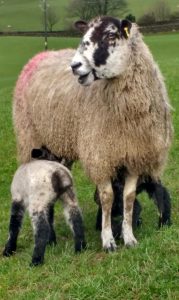 Call me Ishmael.
Call me Ishmael.
Don’t worry, though. I’m not talking harpoons or shotguns here. It’s just that I do get possessed, each spring, by a need to find and gaze upon lambs—the wobblier and boing-ier the better. The obsession comes on really strong in early February and lasts till Mayish, when wild-swimming fever takes over. So there was never any question that lamb-hunting would be a Thing.
And now it’s time! It is a bright cold day in February and the flocks are dotting the green. Well-swaddled, I (more…)
 I read an interview with Alain de Botton in which he revealed that the mirror features in his morning routine only as something he can glance into and ‘check that nothing too terrible [is] happening’. I like that a lot. This is a level of personal grooming I can relate to.
I read an interview with Alain de Botton in which he revealed that the mirror features in his morning routine only as something he can glance into and ‘check that nothing too terrible [is] happening’. I like that a lot. This is a level of personal grooming I can relate to.
But even that isn’t necessary, of course, if you don’t go out of the house. If all you’re going to do is have a cup of tea, why put yourself through grooming, or indeed dressing, at all? Why take off your jamas/house clothes and brush your hair? (Or at least redeploy it; those among you (more…)
You can read this poem here.
Last year, while doing the prep. for a session I was running, I had most of the books off the poetry shelves, looking for texts about friendship that weren’t of the saccharine, emetic, vacuous or Inspirational Verse breeds. I wanted a poem that said something about what friendship is about, how it “works”, rather than merely saying what a Good Thing it is. The celebration of friendship in verse seems to be far rarer, though, than the celebration of romantic love. But I did eventually find a few poems I really liked, which I added to this quiet treasure by Jennings. It was a thought-provoking exercise to go through.
Friendship is, most of the time, both undramatic and glorious. It’s essential without (very often!) causing the pulse to race. I think this poem has the same quality of quiet wondrousness which it celebrates in its subject. It’s written in simple rhyming couplets which are neat without being clangingly predictable. Its rhythm is measured and regular without being stodgy, and is lifted by its judicious use of enjambement. Its vocabulary is unfussy but careful, naming clearly the simple but precious qualities it celebrates—’gentleness… understanding… trust… respect… awe’.
I find the use of the word ‘awe’ really interesting. It makes me think of how friendship—like any of the loves—can remind us, every so often, of the utter other-ness of the other party. This is a real person, distinct from us and with their own set of likes and dislikes, habits and experiences and quirks… and yet they choose to share time with us, to give us the precious gift of themselves. That is indeed awesome—in the Bill-and-Ted sense of great, but also in the proper sense of amazing, wonderful, breathtaking.
 In Notes from a Small island, Bill Bryson puts it like this:
In Notes from a Small island, Bill Bryson puts it like this:
‘I counted thirty-three people there ahead of us, huddled among the fog-whitened boulders with sandwiches, flasks and madly fluttering maps, and tried to imagine how I would explain this to a foreign onlooker—the idea of three dozen English people having a picnic on a mountain top in an ice storm—and realized there was no way you could explain it’. And you can see what he’s saying. However. Whether it’s Britishness, or nature, or nurture, in the end it (more…)
You can read the text of this poem here, and you can listen to John Ireland’s glorious setting of it here.
One of the poetry groups I facilitate recently had as its topic “mountains”, and (among other things) I took the text of this wonderful song. I was, for some reason, quietly pleased to discover that the person who included it on their blog (which is where you’ve just read it) had, like me, discovered it at choir practice. Perhaps what pleases me is that sense of community and connection, across time and miles.
Anyway, this poem doesn’t mention the joys of the high- or mid- altitude cheese sandwich, but I really prize its celebration of what we find in hills: a place of stillness, a sense of that which never changes. No matter what our intellectual understanding may be that these, too, shall pass, it’s hard to feel that when you are out in the hills. Kirkup’s poem has a very simple vocabulary and unfussy style. It’s not saying anything particularly complicated—but I reckon it will resonate with most if not all of us who go out into them there hills. ‘They are both god and temple’: places to be revered and treasured; places which offer nourishment and refreshment; and places where we can reconnect with our own ‘profounder rivers’.
 Call me Ishmael.
Call me Ishmael. I read an interview with Alain de Botton in which he revealed that the mirror features in his morning routine only as something he can glance into and ‘check that nothing too terrible [is] happening’. I like that a lot. This is a level of personal grooming I can relate to.
I read an interview with Alain de Botton in which he revealed that the mirror features in his morning routine only as something he can glance into and ‘check that nothing too terrible [is] happening’. I like that a lot. This is a level of personal grooming I can relate to. In Notes from a Small island, Bill Bryson puts it like this:
In Notes from a Small island, Bill Bryson puts it like this: